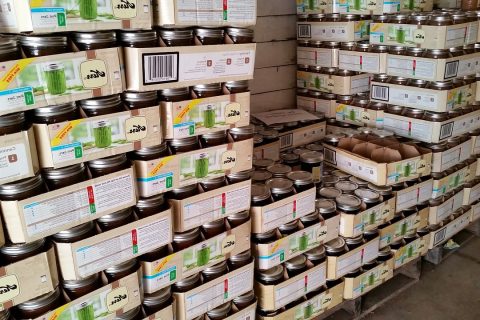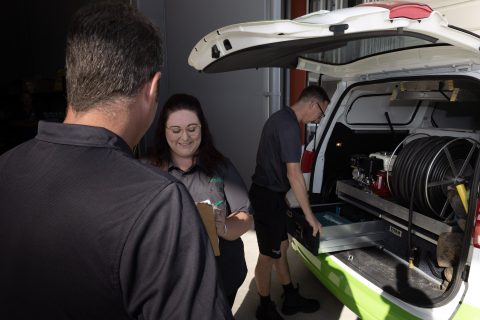Any Questions? Call us today!
Food Manufacturing and Packaging Pest Control


Pest Control for Food Manufacturing and Packaging - Sunshine Coast
When it comes to the Food Manufacturing and Packaging industry, pest control is highly important from multiple points of view: hygiene, economic and legal. A wide variety of pests are found in Australia and they can easily take a company out of business. Not only can they contaminate the food products, leave droppings, body parts, fur or feathers, they can destroy some of the products and also carry dangerous viruses or bacteria.
The laws and legislation in all countries are very strict and they require all food processing plants to be free of pests and food contamination. Effective measures have to be taken to maintain good hygiene, control procedures should be implemented, monitoring needs to be done continuously and procedures should be reviewed periodically. And as soon as any issues is found, a pest control company should be called immediately to fix the problem.
Pests can be brought through the supply chain and can be found in various ingredients or packages. Not only this, but the building itself can attract pests that are looking for food or shelter. Not taking the right measures can lead to substantial fines, costs with stocks and lost products, product recalls, loss of reputation, legal action and eventually the shutdown of the business. So if you have any issues with pests on the Sunshine Coast, call Safeguard Pest Control right away at 07 5477 6675.
Top Pest Concerns for Food Manufacturing and Packaging
1. Stored Products Insects
This generic term covers multiple species of insects, including beetles, weevils, moths, mites and others. A study that looked at 1,000 companies in 5 countries found out that these insects caused the most economic damage to food processing businesses. 60% of the companies that had pests reported annual revenue losses of 1 to 9 %, while 73% of the business owners were highly or moderately concerned about revenue loss because of pests.
The most susceptible products to these types of insects are cereals, seeds, nuts, spices, teas, dried fruits and even preserved meats. Some of these insects can enter the packaging through tiny holes that may not even be visible upon initial inspection. Even if these insects do not consume a large quantity of the product, they will contaminate the entire package through faeces, shed skin, cocoons and so on.
Not only this, but pests in some ingredients can make them change their properties and then cause damage to the production lines and machineries. Replacement costs can be very high and can also lead to fines or closure.
Signs of stored products insects include: damaged goods, holes in products or packaging, live or dead insects, larvae and silken webbing on products, packages, food spillages, beams or window sills.
2. Rodents
Rats and mice are very attracted by food manufacturing facilities, as they can find plenty of food and nesting materials here. They can multiply very fast if they have all the right conditions and can cause a lot of damage. Not only they will eat and destroy the food, but some rats can also damage the sewer systems and electrical equipment.
If they get on the production line they can even damage the machineries and cause downtime that is very expensive. They can also make a lot of mess everywhere with urine, droppings and various materials picked along the way. But they will also contaminate the food and some species can carry very dangerous and even deadly diseases. Besides all of this, the rats themselves carry other pests such as ticks, fleas, lice and mites.
Signs of rodents include; droppings of various sizes, sightings of live or dead rats or mice, squeaky noises or gnawing sounds, smudge marks caused by their wet and oily fur, tracks in dust or powder, gnawed marks on materials, urine stains or smell.
3. Cockroaches
They are small and able to hide in tiny places, yet they can feed a lot and reproduce very fast. Not to mention that they can also carry dangerous diseases such as Salmonella, Staphylococcus, Listeria, E. coli, and also fungi, viruses and parasitic worms. The most common species in food processing plants are:
- The German Cockroach
- The American Cockroach
- The Oriental Cockroach
They are nocturnal creatures and stay hidden in the daytime, getting out at night in search of food. They can shelter in spots that are hard to reach with the usual cleaning methods, such as cracks, crevices, sewers, drains and even inside of equipment.
Their droppings and body secretions will stain and leave a very bad smell, and they can also contaminate foods and packages with their cast skins and egg cases. They shed their skin and droppings are also allergens and can trigger asthma attacks for some people.
3. Flies
Various species of flies are attracted to the odours around food processing plants, and each species has different habits. Some are attracted to sugars, others to oils and fats, vegetable matter or decaying meat. Flies can multiply very fast and can carry more than 100 pathogens that cause serious diseases in humans.
3. Birds
The most common birds found around food facilities are pigeons, seagulls, starlings and house sparrows. They can cause damage to roof tiles and also block guttering with their nests and feathers. Not to mention the nasty droppings they can leave on buildings, vehicles and paved areas.
If they nest inside, their droppings and feathers can contaminate machinery and foods with various parasites including Salmonella, E Coly and Campylobacter.
Use the form below to request a Free Estimate . Requests are answered within 4 hours or less.
Just tell us a few things about your pest problems
Get Rid of Pests Now!
So if you want to avoid substantial fines, to not risk getting your business shut down or your employees and customers sick, call us right away! Whether you have issues with mites, rodents, lice, crickets, weevils, earwigs, wasps, moths, bees, termites, lawn grubs, geckos, fleas, mosquitoes, flies, bed bugs, silverfish, pantry pests, beetles or ticks, we are here to help!
Book your Safeguard treatment now for pest control on the sunshine coast by calling 07 5477 6675 or emailing info@safeguardpestcontrol.com.au and allow us to protect your business against these dangerous and annoying pests.
Popular Questions
Do you spray in kitchens and around food?
Yes we spray in kitchens and around food however we recommend your food to be properly sealed and stored while our treatment is carried out, We use only the best and safest chemical that have low toxicity to humans. Book today call (07) 5477 6675 or email us.
How often should I get a pest control treatment done?
You should get a pest control treatment done at least every 6 to 12 months, our work comes with a 12-month warranty (Terms and conditions apply) We will notify you after 12 months so you can be sure you’re protected all year round. Call us on (07) 5477 6675 to book your Pest control treatment today.
Do we have to vacate the property while you spray?
Our chemicals are safe for you and your family to be around during the treatment. You don’t have to vacate the property while the service is being done. call (07) 5477 6675 to talk with Safeguard Pest Control about any concerns you might have!
Will wet weather affect the treatment?
Some treatments will be postponed, most pest control treatments usually are not affected as properties have eaves and guttering that overhang the exterior walls. Call (07) 5477 6675 or email us to organise your pest control treatment today!
Do you spray inside the house or just outside?
An Internal and external spray will usually be conducted unless a different treatment plan is discussed. For more information check out our Residential Pest control page or Contact us or call (07) 5477 6675 today.